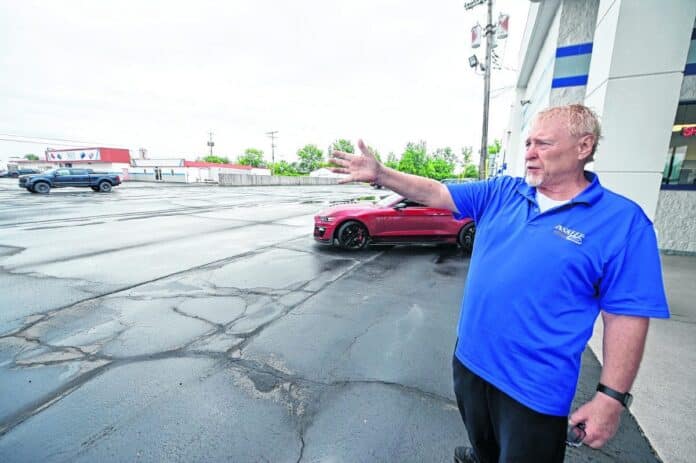
HANCOCK COUNTY — There’s a lot more pavement visible at automobile dealerships these days.
Where are all the vehicles?
Piling up where they’ve been manufactured, waiting on parts for which there’s a massive global shortage.
It’s yet another lingering economic symptom of the COVID-19 pandemic, and it’s impacting businesses in Hancock County that sell cars and make parts for them.
A widening shortage of semiconductors for auto parts is forcing major auto companies to halt or slow vehicle production just as they were recovering from pandemic-related factory shutdowns. Officials at Volkswagen, Ford, Fiat Chrysler, Toyota and Nissan all say they have been hit by the shortage and been forced to delay production of some models in order to keep other factories running, according to news service reports.
“They’ve got thousands of vehicles sitting around various places that are unshippable,” said Jeff Inskeep, owner of Inskeep Ford in Greenfield.
The auto industry is using more semiconductors than ever before in new vehicles, with electronic features such as Bluetooth connectivity and driver assist; navigation; and hybrid electric systems. Semiconductors are typically silicon chips that perform control and memory functions in products ranging from computers and cellphones to vehicles and microwave ovens.
Industry officials say semiconductor companies diverted production to consumer electronics during the worst of the COVID-19 slowdown in auto sales last spring. Global automakers also were forced to close plants to prevent the spread of the virus. When automakers recovered, there weren’t enough chips.
Inskeep said his business started experiencing the effects of the shortage about a month ago.
“Our demand has been awesome,” he said. “Probably a record March and April; then we started running out of inventory.”
He said the dealership usually has more than 100 new vehicles in stock, and last week had just 14. Monthly deliveries usually consist of about 30 vehicles. With the drop-off, a recent shipment was only about a third of that.
It will likely get worse before it gets better. Inskeep said the business is expecting few to no new vehicles over the next three months.
“We’re still going to have a few things trickling in that maybe they’ll get the parts for that are sitting there, but we have no new build allocation allotted,” he said.
He hasn’t seen anything like the current conditions throughout his career. The family business dates back 60 years.
“I feel about as helpless as when COVID came out,” Inskeep said. “There’s nothing I can do.”
Nick Dellen, president of Dellen Automotive, which includes the Dellen Chrysler Jeep Dodge and Chevy Buick GMC dealerships in Greenfield, said his new-car inventory is also far below what he’d normally like it to be. Between both locations, he likes to have 120 to 150 on hand. Currently, there are about 20 to 30 per dealership.
“We’re very lucky; we do have inventory coming in, it’s just selling right when it comes in, which has been good,” Dellen said, adding the company’s service and parts departments are doing well, too.
Compounding the challenge is the shortage of new cars driving up demand, availability and the prices of used ones.
Inskeep said last week that his dealership had about 25 to 30 used vehicles available.
“We’re just trying to buy all the used vehicles we can in any way, shape or form that we can,” he said.
Dellen is used to each of his dealerships selling 40 to 50 new cars a month, typically to customers trading in used vehicles. With the lack of new-vehicle sales leading to a lack of trade-ins, Dellen and many other dealerships are looking to auctions to bolster their used inventories.
Inskeep and Dellen said they’re hearing from the auto industry that it will be toward the end of the year before conditions start to return to normal.
“They think it’s going to continue to loosen up, so to speak,” between now and autumn, Dellen said. “But our inventory levels won’t be anywhere near where they were until the end of the year.”
The semiconductor slowdown is impacting not only auto assembly plants, but parts makers throughout the supply chain, said Peter Spratt, manager of BWI Group’s plant in Greenfield.
“We’re one of the first links in that chain,” Spratt said.
Auto suppliers’ drop in demand has forced BWI, which makes brake and suspension systems, to adjust its production schedule.
“We’ve had to be flexible in our production, and we’ve had to have some people on furlough and reduce our operations and then increase our operations as the demand goes up,” Spratt said. “Our concern has been to keep as many people employed as possible as this demand goes up and down with the available semiconductors.”
This month, BWI’s Greenfield plant is temporarily down to one shift.
“We want to ramp up in July back to our standard three-shift operation,” Spratt said. “We’ll be looking for about 100 people in July, maybe more.”
The company is hearing from customers that demand will increase over the coming months.
“They’re anticipating to build more in the second half of the year than the first half,” Spratt said. “That is probably heavily dependent on semiconductor availability. At the end of the day, we really don’t know until they’re available.”
The Associated Press contributed to this story.




